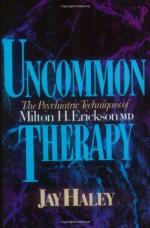
|
| Name: _________________________ | Period: ___________________ |
This test consists of 15 multiple choice questions and 5 short answer questions.
Multiple Choice Questions
1. The case studies in Chapter 6 show that there do not seem to be any __________ of Erickson's use of amnesia.
(a) Irreversible effects.
(b) Detrimental affects.
(c) Immediate effects.
(d) Pleasant effects.
2. The purpose of the therapeutic interventions in Chapter 7 are to provide some _______ regarding the entire situation.
(a) Rational thought.
(b) Scientific perspective.
(c) Third-party objectivity.
(d) Basic laws.
3. There are numerous cases referred to in Chapter 6. One is about a sore that festered for how long?
(a) One year.
(b) Six weeks.
(c) Two years.
(d) Six years.
4. Erickson keyed into the young woman from the car accident's problems when after much probing, he learned that an elder sister had left home, married against the parents' wishes and was now ______.
(a) Suicidal.
(b) Going to have a baby.
(c) Hospitalized.
(d) In rehab.
5. The husband who threatens to kill his wife about the gender of their child is of what occupation?
(a) Laborer.
(b) Doctor.
(c) Lawyer.
(d) Banker.
6. In some cases in Chapter 8, one or more parents would interfere or remove the patient from therapy once what?
(a) No improvements were detected.
(b) The child was upset.
(c) The child was angry.
(d) Improvements were effected.
7. Who is the patient Mesmer took in Chapter 8?
(a) Miss Paradis.
(b) Miss Chatworth.
(c) Miss Sarah.
(d) Miss Duonet.
8. The use of hypnosis in Chapter 9 is used primarily to do what?
(a) End grief.
(b) Overcome addictions.
(c) Alleviate pain.
(d) Assist childbirth.
9. Erickson's use of hypnosis is shown through these case studies to be ______.
(a) Abrasive.
(b) Somewhat effective.
(c) Invasive.
(d) Highly effective.
10. Haley begins Chapter 8 by explaining that the way therapy is conducted has progressed in a leap and that ____ signifies the change from recognizing that problems within a family are just that.
(a) Mesmer.
(b) Jung.
(c) Erickson.
(d) Freud.
11. The parents in one example in Chapter 8 were so competitive, that one of the parents had spent a week in the same town where the daughter lived for the sole purpose of helping the daughter do what?
(a) Do her homework.
(b) Do laundry.
(c) Get to therapy.
(d) Call home.
12. Haley states in Chapter 8 that great dramas are enacted when the dynamic between the parents has grown ______ in any way on their relationships with the offspring.
(a) Despairing.
(b) Dependent.
(c) Despondent.
(d) Detached.
13. What did Erickson accuse the man with the headache of harboring in the end of Chapter 7?
(a) A childish thought.
(b) A 7-year-old's headache.
(c) A childhood resentment.
(d) A 10-year-old's headache.
14. One case in Chapter 6 was about how the therapist helped a mother to re-establish her authority with her son. How old was the child?
(a) Sixteen.
(b) Fourteen.
(c) Six.
(d) Eight.
15. Erickson restricts himself to the truth, which Haley points out as a means that distinguishes him from those seeking to be _____ rather than those who are forthright and have an interest in the welfare of the client.
(a) Helpful.
(b) Manipulative.
(c) Impulsive.
(d) Interrogative.
Short Answer Questions
1. For those who glorify ______, older years may have a more difficult psychological impact.
2. The book ends with the wife of the man who had a stroke contacting Erickson after how long, with a request for a new set of therapeutic treatments?
3. The 19th-century method was to treat a patient in what way?
4. The therapists of the 19th-century noticed that there was something deeper going on; here Mesmer and ____ are used as examples
5. In one case of a wife who dominated her husband in Chapter 7, if a caller on the phone wouldn't announce who they were she would do what?
|
This section contains 576 words (approx. 2 pages at 300 words per page) |

|




